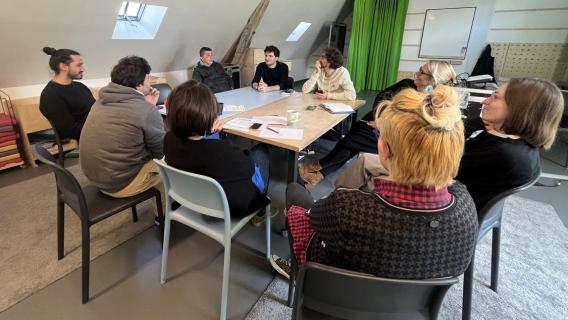Opinion on Net Neutrality n°2013-1 of 1 March 2013
ACTING ON A MANDATE FROM MINISTER FLEUR PELLERIN, THE FRENCH DIGITAL COUNCIL HAS ISSUED A UNANIMOUS OPINION: THE PRINCIPLE OF NET NEUTRALITY SHOULD URGENTLY BE EXTENDED AND INCORPORATED INTO FRENCH LEGISLATION AT THE HIGHEST LEVEL
For their first opinion, the members of the French Digital Council (CNN) held a plenary session chaired by Benoit Thieulin to study the report submitted by the working group on net neutrality, headed by Christine Balagué and comprising Serge Abiteboul, Tristan Nitot, Jean-Baptiste Rudelle, Jean-Baptiste Soufron, Bernard Stiegler and Marc Tessier.
The opinion was unanimously adopted to meet the needs of legal security and economic constraints (start-ups, operators, etc.) and lay down a simple, but effectively constitutional principle. In a practical move, the CNN rounded out this opinion with a report, a map of controversies and a series of examples.
The opinion states that we are in the midst of a new industrial and cultural revolution, where the Internet and a whole wave of creation and innovation are driven by the principle of neutrality. Yet net neutrality is currently under threat from content filtering, censorship and slowing and blocking practices.
The CNN sees the issue as clear-cut: net neutrality must be incorporated into French legislation at the highest level of the hierarchy of norms. This will give concrete shape to the principle of digital equality, provide the means for the freedom of expression and communication, and serve as a basis for the freedom of creation and innovation – for both users and start-ups.
Under the definition proposed by the CNN, rather than adopting an endless list of exceptions that would render the principle of neutrality meaningless and ineffectual, net neutrality is a principle defined by what it guarantees. It is not absolute. It guarantees non-discriminatory yet equitable and transparent access.
It extends beyond the networks themselves to take in the major “access and communication services”, i.e. services providing access to other services, which have now become indispensible.
This principle is fully applicable and builds on existing legislation. The penalties are those that have already been laid down and will be enforced by the relevant jurisdictions (courts, authorities, etc.). It can be rolled out gradually: new technologies can be included and new penalties introduced. The access and communication services should be defined progressively.
The CNN therefore proposes amending the 1986 Freedom of Communication Act to incorporate the principle of neutrality defined as follows: “the neutrality of communication networks, infrastructures and access and communication services open to the public by means of electronic channels shall guarantee access to information and means of expression on a non-discriminatory, equitable and transparent basis.”
Benoit Thieulin, President of the French Digital Council, says, “With our first opinion, the CNN has the opportunity to establish a historic driving principle behind the digital revolution. France can lead the way in the defence of Internet values and promote the equality of access to the network for all. It has been unanimously agreed that the CNN ask for neutrality to be established as a fundamental principle in order to guarantee freedom of expression.”
Christine Balagué, Vice-President of the French Digital Council, adds, “This opinion is crucial as it is the first to acknowledge that this is a constitutional principle and to lay it down for communication networks and the infrastructures, and to extend it to access and communication services open to the public.”
---
Text of the Opinion On Net Neutrality No. 2013-1 of 1 March 2013
Pursuant to Decree 2012-1400 of 13 December 2012, the French Digital Council was given a mandate by Fleur Pellerin, Minister Delegate for Small and Medium-Sized Enterprises, Innovation and the Digital Economy, to examine the question of Net Neutrality in terms of the effectiveness of current legal provisions with a view to protecting the freedom of expression of Internet users.
Having regard to the report from the working group comprising Serge Abiteboul, Christine Balagué, Tristan Nitot, Jean-Baptiste Rudelle, Bernard Stiegler, Jean-Baptiste Soufron and Marc Tessier,
On 1 March 2013, on the basis of a unanimous decision,
the Council is of the opinion:
That French legislation does not sufficiently protect freedom of expression in view of the development of content filtering, blocking, censorship and slowing practices.
That the principle of neutrality should be recognised as a fundamental principle necessary for the freedom of communication and the freedom of expression and written into the law at the highest level of the hierarchy of norms:
- Into the title of the 1986 Act, renamed “Freedom of Expression and Communication Act” rather than solely “Freedom of Communication Act”
- Into the second paragraph of the first article of the 1986 Act, to read, “The neutrality of communication networks, infrastructures and access and communication services open to the public by means of electronic channels shall guarantee access to information and means of expression on a non-discriminatory, equitable and transparent basis.”
That the principle of neutrality should supplement and clarify the existing legislative provisions:
- As a fundamental freedom, its enforcement is to be directly under the control of the courts. Any restriction may only be made by common law and in compliance with rule of law procedures.
- Through the freedom of communication and expression, the principle of neutrality asserts the freedom of creation and innovation and contributes to digital citizenship. Its implementation should constantly keep pace with technological innovations, economic change and developments in uses, especially with regard to mobile technology, peer-to-peer communications and connected objects. It is for the executive and the legislature to establish a method of governance and a timeframe, if deemed necessary.
That, lastly, to ensure the effective, enduring implementation of this principle, indicators should be set up to measure the level of neutrality of networks and services open to the public, in liaison with the political, economic and social stakeholders and the regulatory authorities, including at European level.








